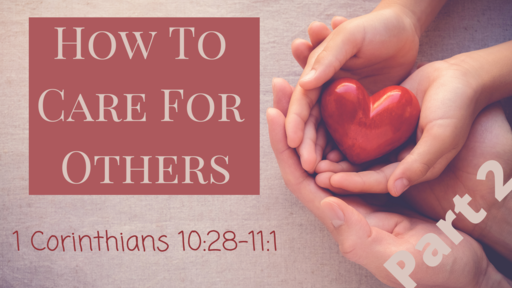How To Care For Others (part 2) - 10:28-11:1

Introduction
1. Seek Their Good vv. 23-24
a. This demands discernment v. 23
b. This demands determination v. 24
2. Guard Their Conscience vv. 25-30
a. Ask necessary questions vv. 25-27
b. Avoid doubtful decisions vv. 28-30
We might think that in such a situation Paul would have advocated exercising Christian liberty to eat the meat, but he did not. He advocated abstaining, not because such meat was out of bounds for believers. It was not out of bounds; Christians could eat such meat. He advocated abstaining for the sake of the pagan’s moral consciousness. Specifically, if the Christian ate the meat, the pagan might conclude that his guest was doing something Christians should not do. He would be wrong, of course. Yet Paul advocated not violating the pagan’s understanding of what Christians should or should not do rather than instructing him about Christian freedom at the table.
We do not need to alter our convictions for the sake of others even though they speak evil of us, as the Corinthians did of Paul (cf. 9:19–23). Nevertheless we should be willing to change our behavior for the sake of unbelievers.
3. Desire Their Salvation vv. 31-11:1
a. Live for the glory of God v. 31
The principle is clear. The Christian is not concerned with his rights, but with the glory of God (cf. Col. 3:17). Eating, drinking, everything must be subordinated to this.
